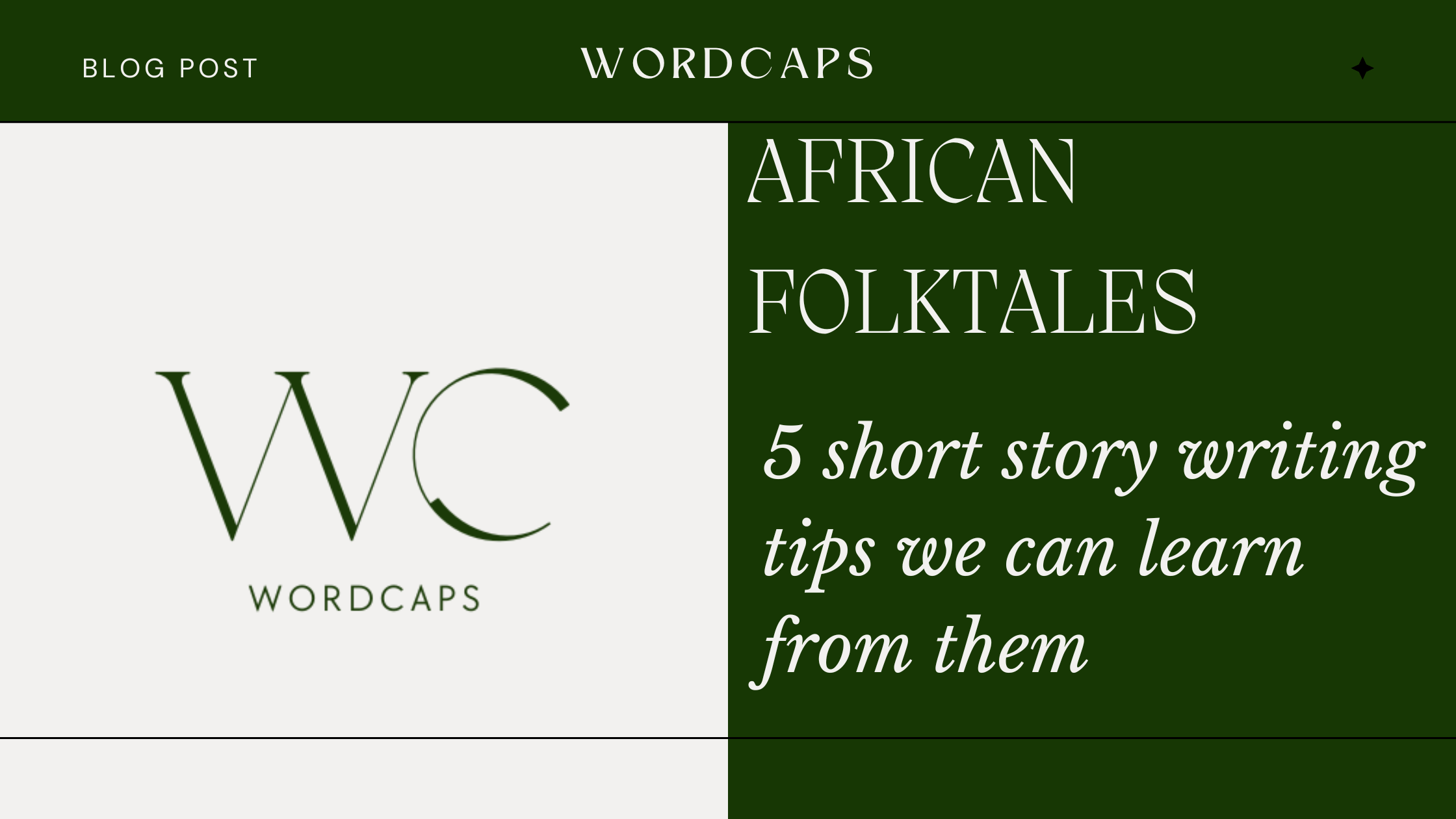African folktales are often full of wisdom, songs, and unforgettable characters. But beyond these are effective short story writing tips that we can glean from them. This article will share five short story writing tips from African folktales, why you should adopt them, and how to execute them.
1. Establish the desire of the villain or hero from the outset
One of the loveable things about African folktales is that you can identify the desire of the villain or hero from the very beginning. It is always clear what they want and why this desire is (or may be) unattainable.
As you write your short story, it is crucial to establish what the hero or villain wants promptly. This helps the reader understand what’s at stake and why they need to keep reading.
In this Zimbabwean folktale about the midnight goat thief, we see that the desire of the hare is to eat to his heart’s content. But as we go along in the story, we see that his desire is really two-fold: to eat abundantly and take advantage of anyone to ensure this. We can infer this from the moment he chooses to send his friend back for help, instead of plucking the herbs himself on their journey. This inference gives us a hint of some upcoming mischief and causes us to worry about the other character. This is good; you want readers to worry about your character.
Try not to keep the reader wondering what the story is about, and establish the villain’s or hero’s desire from the outset.
Why you should establish the desire of the hero or villain early
- It helps the reader to get involved. They start to think about this desire and speculate on the hero or villain’s ability to attain it. This keeps them engaged to its conclusion.
- It helps you, the writer, identify what you’re working towards and keep the story’s aim in focus.
How to establish the desire of the hero or villain in your short story
- Give the character a relatable desire.
- Create a believable obstacle to achieving that desire. A good idea might be to give them a character flaw that prevents them from attaining it. Alternatively, you can think of a believable hero or villain who also wants the same thing they do.
Short stories don’t have the luxury of length, so getting your reader’s attention early is vital to your short story’s success.
2. Give the villain or hero a personality strength or flaw (give your character character)
African folktales often use a personality strength or flaw to instill a moral lesson: The turtle was greedy, so don’t be greedy. The baboon was too trusting, so don’t be too trusting. These personality strengths or flaws help to make the story believable. One is hardly ever blindsided by the narrative plots of these folktales because the characters’ qualities facilitate the outcomes.
In this Nigerian folktale about how the tortoise got the cracks on its shell, the tortoise’s personality flaw is its cunningness. We see this cunningness woven throughout the story, connecting the plot points and securing the steady decline from the climax to the resolution.
Why you should give the villain or hero a personality strength or flaw
- It makes the story believable.
- It makes the characters relatable.
- It helps in story development.
- It helps you stay true to the character’s identity.
How to give your villain or hero a good personality strength or flaw
- Think of a remarkable person you know and identify what makes them so. Or perhaps think of a time you did something really good (or bad) and what personal quality made you do so. You can give these qualities to your characters. When the personality strength or flaw is one of yours, it helps you to understand the character even better because you know what it’s like to be them.
- Constantly seek to understand humans and why people do things the way they do. It will help you to create relatable characters and write objectively.
3. Create suspense
Suspense is a key element of African folktales and storytelling. Imagine little children surrounding an elderly person, their faces illuminated by the moonlight, all anticipating the next words of the experienced storyteller. The ability to hold the attention of young children is a vital ingredient of these folktales.
The same ingredient is necessary for short story writing. A short story is most effective when the characters and plot intrigue the reader from the beginning to the end. Suspense is not needlessly drawing out the story, rather, it is drawing the reader into the mind of the character as they make a crucial decision that can make or mar them or other characters. The reader should always be asking: What is this character going to do?
Why you should create suspense in your short story
- It keeps the story interesting, and the reader engrossed.
- When executed well, it gives a more satisfying end to the story.
- It creates an avenue for your reader to understand the character even better.
How to create suspense in your short story
- Leave hints within the dialogue or the narrative that show the character’s dilemma.
- Infer (or reveal) a severe consequence of the character’s decision, i.e., let the reader know what’s at stake.
- Introduce the impact of other characters’ decisions. This presents another view of the situation at hand. How will the actions or inactions of the other characters affect the character?
4. Give your short story a good title
If you struggle with giving appropriate titles to your short stories, perhaps you can try reading a few African folktales. You might gain incredible insights! The titles are mostly persuasive and fascinating. Here are a few examples:
- The midnight goat thief
- How the tortoise got the cracks on his shell
- Why turtles live in water
- One good meal deserves another
- Why the leopard has spots
- Ananse and the pot of wisdom
What do you notice about these titles? They are all direct and give a hint of the story. While these may not always work for your short story, one thing we can learn is to make short story titles as direct as possible. Try including something that’s integral to the story in the title. In my short story, “Off and On Carter Adebowale Street,” I chose a title that mentions the road that the major characters eventually pass through. Other examples include “What it Means When a Man Falls from the Sky” by Lesley Nneka Arimah and “Sweet, Sweet Strawberry Taste” by Samuel Kolawole.
Why you should give your short story a good title
- It arouses interest and will likely cause readers to explore your story.
How to give your short story a good title
- Create a title around the theme of your short story.
- Pick a random punchy line from your story.
4. Give your short story a solid, satisfactory ending
African folktales often end satisfactorily, otherwise, they would lose their potency. The solid ending of these folktales causes children to request for them to be retold. As a young girl, I often loved hearing the ending of the story of how the tortoise became bald. I couldn’t believe how strongly the turtle’s personality flaw could push him to make such a self-sabotaging decision.
It’s one thing for your story to start well, and it’s another for it to end well. Aim to make your short story unforgettable; give it a satisfactory ending. A satisfactory ending doesn’t necessarily mean that it is a happy or predictable one. Rather, a satisfactory ending brings a resolution of some sort to the story’s climax.
Why you should give your short story a solid ending
- It makes it unforgettable; readers will want to read it again.
- It establishes you as a writer who understands the principle of the story arch. This is good for your self-esteem. 😊
How to give your short story a solid ending
- Ask yourself (or get a beta reader to determine) if the story has resolved from the climax.
- Ensure that the protagonist evolves after the climax. This usually resolves the tension that has peaked.
There’s a lot we can learn from African folktales. Writing short stories doesn’t have to be as difficult as some find it. Following these simple tips will help you become the writer of your dreams and ensure that your short stories are unforgettable.


Published by